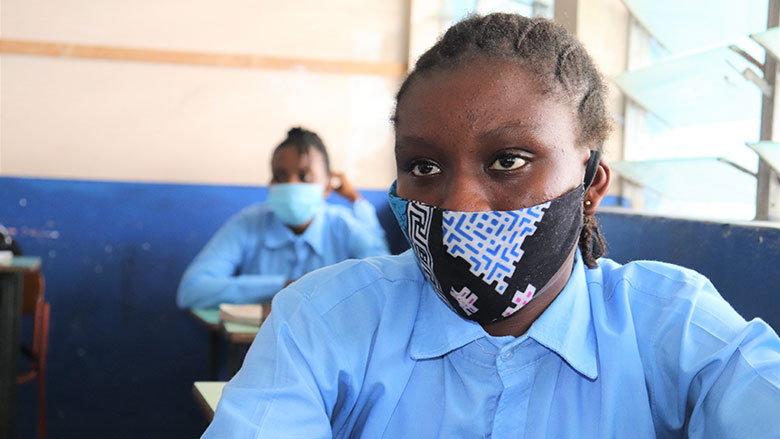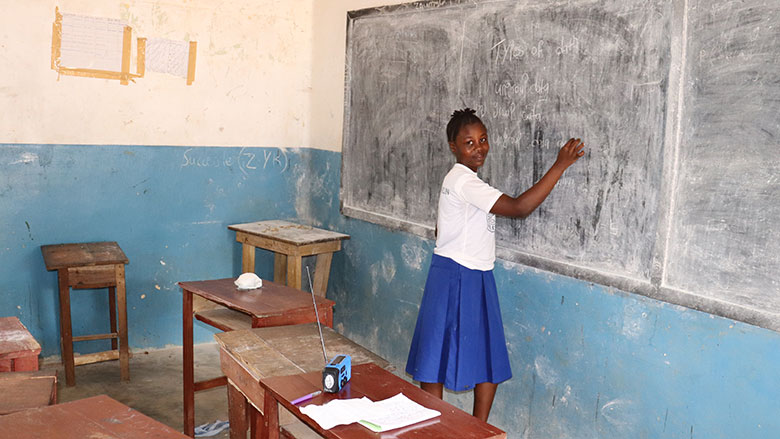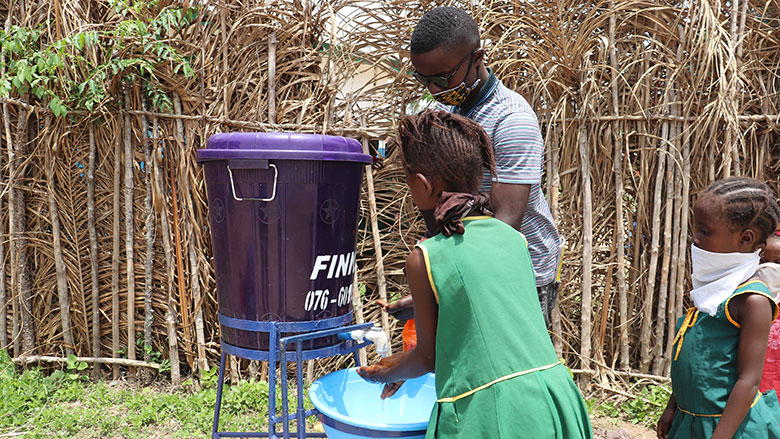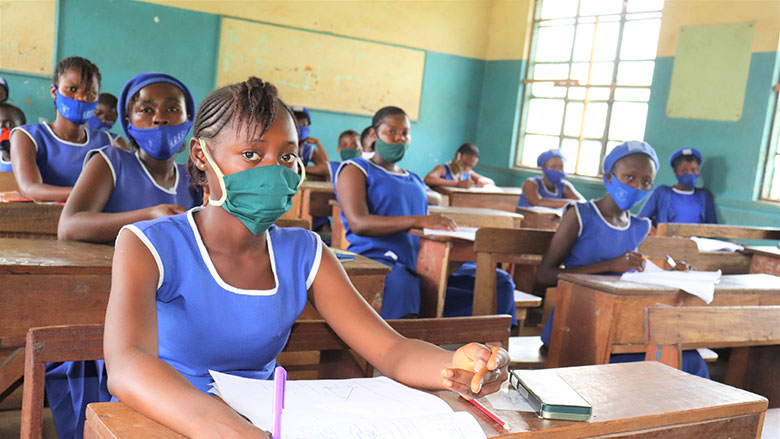Challenge
Even before COVID-19 hit, Sierra Leone was facing a dire human capital situation, as evidenced by its education outcomes, which were among the lowest in the region. Based on the World Bank Human Capital Index, children were expected to be 36 percent as productive when growing up as they could be if they enjoyed a complete education and full health. The COVID-19 pandemic caused a crisis within a crisis. In March 2020, all schools closed. Sierra Leone had lived through a similar shock in 2014, when the Ebola crisis led to eight months of school closures. The potential for a prolonged catastrophe was evident. Indeed, the country remembered a time where most children were eating less, learning less, and facing increased violence and exploitation. For example, Ebola left more than 12,000 children orphaned. Girls from the ages of 12–17 were 16 percent less likely to return to school. Child labor by girls also increased by 19 percentage points. In addition, teenage pregnancy increased by up to 65 percent in some communities. Sierra Leone wanted to write a different story this time.
Approach
The FREE project focuses on improved management of the education system, teaching practices, and learning conditions. When the pandemic occurred, the World Bank adapted the project to support the Government’s education response and reduce learning losses. The main approach was to keep students safe and minimize learning losses through the use of distance learning. The project was also instrumental in getting the Radio Teaching Program aired quickly. In addition, the project supported communication and sensitization campaigns to prevent the spread of COVID-19; keeping girls engaged in learning, and preventing pregnancies; and getting all children back to school. Additionally, school safety protocols and psychosocial support guidelines developed during the Ebola crisis were adapted and distributed to all primary and secondary schools, and teachers were trained to use them.
To maintain hygiene standards for COVID-19 prevention, all schools were equipped with face masks, soaps, buckets, and infrared thermometers. The project also supported the Annual School Census, which captures accurate data on all preschools, as well as primary, junior and senior secondary schools using tablets. Building on the experience of the Ebola crisis, in March 2020, the Government overturned a ban with immediate effect that had prevented pregnant girls from attending school and sitting for exams. Thus, the FREE project helps the Government strengthen legal and policy frameworks that promote inclusion of all children in Sierra Leone.

Results
The FREE project was adapted to support the Government’s COVID-19 response and reduce student’s learning loss. Several important outcomes have emerged:
- School safety, protection and wellbeing: Keeping students and teachers safe and healthy is important for minimizing learning loss. When COVID-19 hit, the Ministry of Basic and Senior Secondary Education (MBSSE) adapted the school safety protocols and psychosocial support guidelines that had been developed during the Ebola crisis to keep children and teachers safe. These documents have been distributed to all primary and secondary schools (11,000). About 22,000 teachers were trained before schools reopened on October 5, 2020. To maintain hygiene standards for COVID-19 prevention, all primary and secondary schools have been equipped with hygiene and safety products, such as face masks, soaps, buckets, and infrared thermometers (about 2 million students benefitted from this support).
- Continuous, distance education: Just one week after schools were closed in March 2020, the Government was able to provide the Radio Teaching Program as a distance education alternative. It reached about 1.4 million children (including 700,000 girls) during the period when all schools were closed, that is, from the end of March 2020 until early October 2020.
- Communications and sensitization: The Government implemented communications and sensitization campaigns about the spread and prevention of COVID-19, gender-responsive actions, and back-to-school arrangements. These communications efforts targeted the most vulnerable, including girls and children in rural areas.
- Annual School Census: Since 2018, the Government has conducted an Annual School Census, which captures data about all preschools, as well as primary, junior and senior secondary schools using tablets. The Census includes data about enrollment; student repetitions and transfers; the number of children with special needs; the availability of basic inputs (for example, the number of children without a seating space); student and teacher absenteeism; teacher gender, experience and qualifications; and infrastructure (for example, access to electricity, water and sanitation, and hygiene, infrastructure, and Global Positioning System [GPS] coordinates, among others).
- Promoting learning inclusion of all children: The FREE project helps the Government to strengthen the legal and policy framework to promotes inclusion of all children in Sierra Leone. The Government is developing the Radical Inclusion Policy, which is also supported by the FREE project. In addition, the project will support the Government in implementing the policy.
World Bank Group Contribution
The FREE Project (a US$50 million IDA grant) supported the initial implementation of the Government’s COVID-19 education response. This has been supplemented by the World Bank’s analytical and advisory support, including: (i) an Early Learning Platform (ELP) Trust Fund (US$30,000), which supports a radio learning program for early childhood development; (ii) an Education Public Expenditure Review; (iii) a Strategic Impact Evaluation Fund (SIEF) COVID-19 Emergency Grant (US$270,000), which supports a technical assistance activity entailing an impact evaluation of technology-aided, teacher-student interactions due to the COVID-19 crisis.

Partners
The FREE is co-financed by a US$15.97 million equivalent amount from the United Kingdom’s Foreign, Commonwealth and Development Office, Irish Aid, and the European Union. These funds are contributions to a World Bank-administered Sierra Leone Education Multi-donor Trust Fund.
Moreover, the World Bank has become a grant agent for a Global Partnership for Education-supported additional financing (AF) of US$6.85 million. Under this AF, there is an implementation partnership arrangement with a Save the Children-led non-governmental organization (NGO) Consortium to deliver activities rapidly, focusing on community engagement, and reaching the most marginalized and deprived groups. Other partners of the consortium include: Handicap International; Plan International; Concern Worldwide; the Foundation for Rural and Urban Transformation (FoRUT); Focus 1000; and Street Child of Sierra Leone.
Regarding the SIEF-funded impact evaluation, collaboration efforts are being made with the Center for Global Development and Rising Academies in Sierra Leone.
Moving Forward
The FREE project increased support to the Government’s efforts to continue learning, despite COVID-19. The response allows the Government to build a more resilient, equitable and personalized system, including. First, the system will be more resilient, as evidenced by the Radio Teaching Program, which complements regular schooling. It allows for learning to happen beyond the school walls. Support was also offered for legal and policy reforms. Second, the system will be more equitable, as support to girls and other vulnerable students will continue after the crisis, helping them to get to school and stay there. Third, the system will be more personalized, with teacher training to provide psychosocial support and teach to the level of the student.

Beneficiaries
Just one week after schools closed in March 2020, 1.4 million children could tune into the radio and listen to their lessons. Many of these children endured hunger, mistreatment and anxiety while at home. Fortunately, schools reopened as early as July 2020 for exam takers. In October 2020, the schools reopened for all students. Children are now appropriately equipped with masks and follow health protocols (including temperature checks and handwashing). As such, they have been able to return to school and receive additional psychosocial support from their teachers.
“I like to listen to the radio program, as it is interactive and fun! Additionally, I received printing material as additional learning support.” Fatmata, a Junior Secondary School Student
“During COVID-19, we drew on the experience from the Ebola crisis by having School Safety Protocols in place and equipping schools with face masks, soaps, buckets, and infrared thermometers.” Victor Marah, Head Teacher of a Primary School
"COVID is there, schools have closed, but my desire to transform education and bring quality learning has not changed, and that cannot stop." David Moinina Sengeh, Minister of Basic and Senior Secondary Education, Sierra Leone

